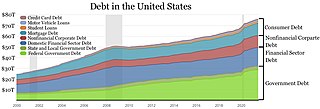Related Research Articles

Debt is an obligation that requires one party, the debtor, to pay money borrowed or otherwise withheld from another party, the creditor. Debt may be owed by a sovereign state or country, local government, company, or an individual. Commercial debt is generally subject to contractual terms regarding the amount and timing of repayments of principal and interest. Loans, bonds, notes, and mortgages are all types of debt. In financial accounting, debt is a type of financial transaction, as distinct from equity.

The Panic of 1837 was a financial crisis in the United States that began a major depression which lasted until the mid-1840s. Profits, prices, and wages dropped, westward expansion was stalled, unemployment rose, and pessimism abounded.
Fixed income refers to any type of investment under which the borrower or issuer is obliged to make payments of a fixed amount on a fixed schedule. For example, the borrower may have to pay interest at a fixed rate once a year and repay the principal amount on maturity. Fixed-income securities can be contrasted with equity securities that create no obligation to pay dividends or any other form of income. Bonds carry a level of legal protections for investors that equity securities do not: in the event of a bankruptcy, bond holders would be repaid after liquidation of assets, whereas shareholders with stock often receive nothing.

The Fair Credit Reporting Act (FCRA), 15 U.S.C. § 1681 et seq., is federal legislation enacted to promote the accuracy, fairness, and privacy of consumer information contained in the files of consumer reporting agencies. It was intended to shield consumers from the willful and/or negligent inclusion of erroneous data in their credit reports. To that end, the FCRA regulates the collection, dissemination, and use of consumer information, including consumer credit information. Together with the Fair Debt Collection Practices Act (FDCPA), the FCRA forms the foundation of consumer rights law in the United States. It was originally passed in 1970, and is enforced by the U.S. Federal Trade Commission, the Consumer Financial Protection Bureau, and private litigants.
The Anglo-Irish Trade War was a retaliatory trade war between the Irish Free State and the United Kingdom from 1932 to 1938. The Irish government refused to continue reimbursing Britain with land annuities from financial loans granted to Irish tenant farmers to enable them to purchase lands under the Irish Land Acts in the late nineteenth century, a provision which had been part of the 1921 Anglo-Irish Treaty. This resulted in the imposition of unilateral trade restrictions by both countries, causing severe damage to the Irish economy.
In accounting, a down payment is an initial up-front partial payment for the purchase of expensive goods or services such as a car or a house. It is usually paid in cash or equivalent at the time of finalizing the transaction. A loan of some sort is then required to finance the remainder of the payment.
Battlers, in Australian colloquialism, are ordinary working-class people who persevere through their commitments despite adversity. Typically, this adversity comprises low pay, family problems, environmental hardships and personal recognition woes. It is a term of respect and endearment intended to empower and recognise those who feel as though they exist at the bottom of society. It has seen recent use in mainstream politics to describe a demographic of Australian people, most notably by former Prime Minister John Howard, who used it to describe his working-class voting base.
The Conference on Jewish Material Claims Against Germany, or Claims Conference, represents the world's Jews in negotiating for compensation and restitution for victims of Nazi persecution and their heirs. According to Section 2(1)(3) of the Property Law of Germany, the Claims Conference is a legal successor with respect to the claims not filed on time by Jewish persons. This fact was reasserted in decisions of some lawsuits which attempted to redefine the Claims Conference as a "trustee" of these assets. These lawsuits were dismissed. The Claims Conference administers compensation funds, recovers unclaimed Jewish property, and allocates funds to institutions that provide social welfare services to Holocaust survivors and preserve the memory and lessons of the Holocaust. Julius Berman has led the organization as chairman of the board, and currently president, as of 2020.
Debt settlement is a settlement negotiated with a debtor's unsecured creditor. Commonly, creditors agree to forgive a large part of the debt: perhaps around half, though results can vary widely. When settlements are finalized, the terms are put in writing. It is common that the debtor makes one lump-sum payment in exchange for the creditor agreeing that the debt is now cancelled and the matter closed. Some settlements are paid out over a number of months. In either case, as long as the debtor does what is agreed in the negotiation, no outstanding debt will appear on the former debtor's credit report.

In the United States, student loans are a form of financial aid intended to help students access higher education. In 2018, 70 percent of higher education graduates had used loans to cover some or all of their expenses. With notable exceptions, student loans must be repaid, in contrast to other forms of financial aid such as scholarships, which are not repaid, and grants, which rarely have to be repaid. Student loans may be discharged through bankruptcy, but this is difficult. Research shows that access to student loans increases credit-constrained students' degree completion, later-life earnings, and student loan repayment while having no impact on overall debt.
Forbearance, in the context of a mortgage process, is a special agreement between the lender and the borrower to delay a foreclosure. The literal meaning of forbearance is "holding back". This is also referred to as mortgage moratorium.
Exceptional circumstances are the conditions required to grant additional powers to a government agency or government leader so as to alleviate, or mitigate, unforeseen or unconventional hardship. The term is commonly used in Australia, where it has been applied in various contexts, most recognizably in relation to special consideration policies for students and drought relief payments for farmers known as Exceptional Circumstances Relief Payments or ECRP.
Student loan deferment is an agreement between the student and lender that the student may reduce or postpone repayment of a student loan for a designated period. Deferment or forbearance will prevent the loan from going into default, but may increase the overall cost of the loan. Students may be eligible for deferment while experiencing financial hardship or unemployment. The lender may require valid proof of financial hardship and other financial information when the student applies.
Willard v. Tayloe, 75 U.S. 557 (1869), was a decision by the Supreme Court of the United States that courts of equity deciding issues of contract have discretion to determine the form of relief based on the circumstances of each individual case. The Court established a new rule to determine the form of relief: Relief should serve the ends of justice, and should be withheld if it appears likely to produce hardship or injustice to either party.
Universal Credit is a United Kingdom based social security payment. It is means-tested and is replacing and combining six benefits, for working-age households with a low income: income-related Employment and Support Allowance (ESA), income-based Jobseeker's Allowance (JSA), and Income Support; Child Tax Credit (CTC) and Working Tax Credit (WTC); and Housing Benefit. An award of UC is made up of different elements, which become payable to the claimant if relevant criteria apply: a standard allowance for singles or couples, child elements and disabled child elements for children in the household, housing cost element, childcare costs element, as well as elements for being a carer or having an illness or disability and therefore having limited capability to work.
A short term benefit advance is a feature of the British social security system whereby a claimant can get an advance of certain benefit payments in the form of a loan which they have to pay back. Short term benefit advances are designed to support those who are in financial need.

The Nation's Future Party, also known as the Future of the Nation Party or Mostaqbal Watan, is an Egyptian political party. The party is often seen as a "party of power", created for the sole purpose of backing President Abdel Fattah el-Sisi and his policies.
The individual shared responsibility provision, less formally known as the individual mandate, was the health insurance mandate imposed on individuals by the Affordable Care Act in the United States until tax year 2019. This individual mandate required most individuals and their families to have a certain minimal amount of health insurance, with certain exemptions. Otherwise, they were required to pay the individual shared responsibility payment as a fine. It was one of the many Affordable Care Act tax provisions. The federal tax penalty for violating the mandate was eliminated by the Tax Cuts and Jobs Act of 2017, starting in 2019..
Sorsa's second cabinet was the 60th government of Finland. The majority cabinet was in office from 15 May 1977 to 26 May 1979. The prime minister was Kalevi Sorsa (sd.).
In finance, a repayment plan is a structured repaying of funds that have been loaned to an individual, business or government over either a standard or extended period of time, typically alongside a payment of interest. Repayment plans are prominent within the financial industry of a national economy where liquid funds are in high demand to assist in investment opportunities, governmental expenditure or personal finance. The term first saw prominence with its use by the International Monetary Fund to describe its form of financial loan repayment from individual nations. Typically, the term "repayment plan" refers to the system of Federal Student Aid in the United States of America, which assists in covering tertiary education expenses of domestic students.